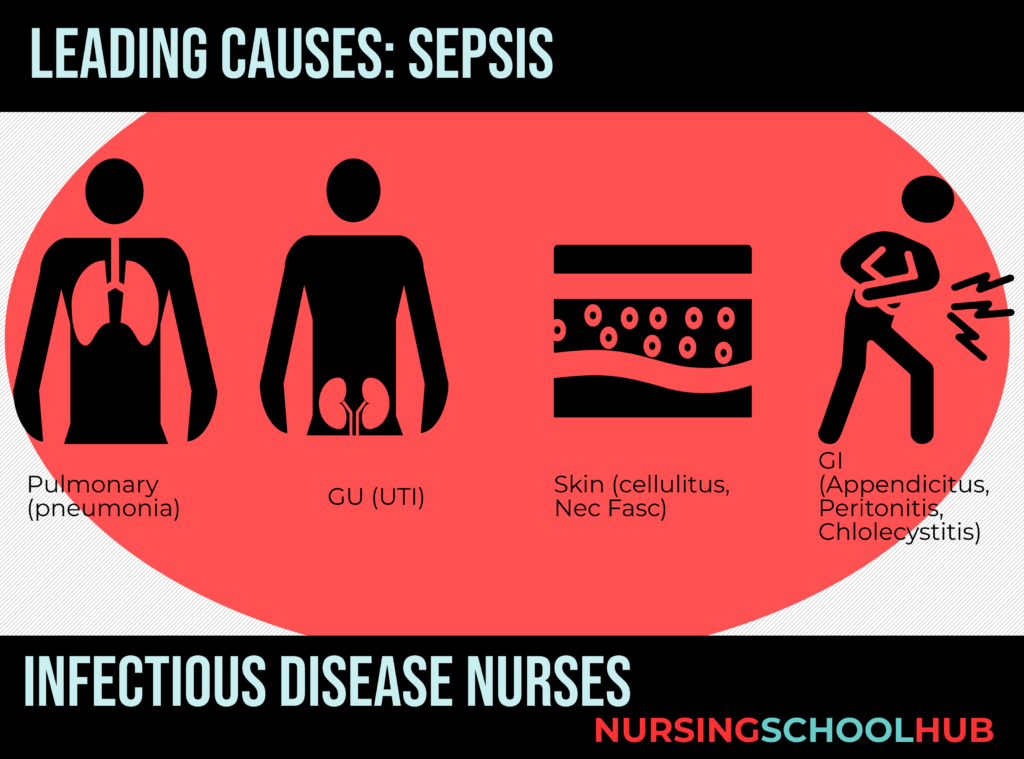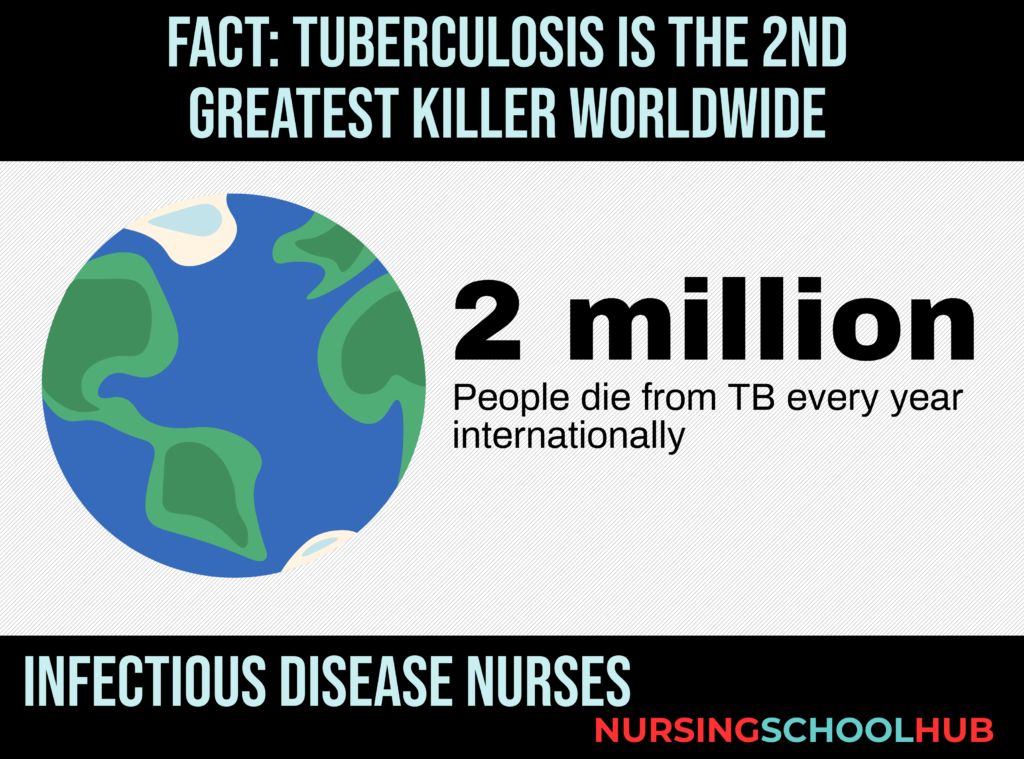Infectious Disease Nursing is a specialization that focuses on treating and preventing infectious diseases. In the age of the coronavirus pandemic, there is more need for nurses with infectious disease expertise than ever before. What is infectious disease nursing? It’s an especially challenging but vitally important form of nursing. Infectious disease nurses have to deal with some of the most difficult situations in the healthcare world. As a result, these nurses must have plenty of education, training, and experience in the field.
Infectious disease nursing has a lot in common with general nursing. However, as you’ve probably figured out, infectious disease nurses specialize in infectious diseases. They’re primarily concerned with treating, preventing, and stopping the spread of these diseases so that those who catch them can have a better health outlook and those who are healthy can avoid these diseases. Infectious disease nurses take on a wide variety of roles in the healthcare world, as you’ll see below.

What Does an Infectious Disease Nurse Do?
Featured Programs
What does an infectious disease nurse do? That question has several answers. Infectious disease nursing jobs are varied, and infectious disease nurses can work in a range of settings. Many, of course, work in hospitals. Others work in schools, laboratories, or government buildings.
What are Some Infectious Disease Nursing Jobs?
Some infectious disease nurse jobs involve working directly with patients who have contracted infectious diseases or are at a higher risk for these diseases. For example, these infectious disease nursing jobs may work with patients who have a high risk of contracting HIV, or they may treat patients whose wounds have become infected. They may also be in charge of isolating individuals who are highly contagious.
There are, of course, infectious disease nurse practitioner jobs, which put nurses in a position to provide direct medical care. These infectious disease nurse practitioner jobs are highly challenging, but the nurses who take on these jobs can make a huge difference in people’s lives.
Many infectious disease nurses also work in the educational sphere, sometimes teaching courses at universities or working in the field of public health. Some work alongside researchers as they gain more information about specific diseases and possible treatments. Others work with lawmakers, providing insight about diseases that can impact public health laws. Overall, there’s no shortage of job opportunities for nurses in this part of the field.
Can You Tell Me How to Become an Infectious Disease Nurse?
Becoming an infectious disease nurse is no easy task, but for those who are passionate about treating and preventing infection, it’s absolutely worth all of the time and effort that they put into their careers.
When figuring out how to become an infectious disease nurse, the most important thing is getting the right education. Most infectious disease nurses have both a Bachelor’s (BSN) degree and a Master’s (MSN degree). This gives them a cumulative education of six years. You can practice nursing in between degrees, however. Many nurses do get a job in between their BSN and MSN degrees. This way, they can save money on student loans before finishing their education.
Nurse Practitioner Infectious Disease Jobs
If you’re interested in nurse practitioner infectious disease jobs, you’ll definitely need an MSN. That’s the minimum requirement, both for nurse practitioner infectious disease jobs and for nurse practitioner jobs in general.
Now, you won’t necessarily need a specific degree in infectious disease nursing to practice as an infectious disease nurse. It may be a challenge to find a specific infectious disease nurse practitioner program, for example. However, if you are looking for an infectious disease nurse practitioner program or something similar, look for programs that let you specialize in certain concentrations.
Any nursing degree program should teach you the basics of infectious disease control methods like sanitization, isolation, and hygiene. However, by finding a degree that lets you specialize with a concentration, you can take a deeper dive into this part of the healthcare field.
Do I Need Infectious Disease Nurse Certification?
Infectious disease nursing certification is not required for infectious disease nursing. As a matter of fact, you can’t even take the certification exam without having some experience in infectious disease nursing, first. However, it is a good idea to get a certificate after a couple of years of work experience. Why? Because with your infectious disease nursing certification, you can open up possibilities for promotions.
By earning your certification, you show your employers that you’re willing to go above and beyond the call of duty. You’re showing them that you’re willing to put lots of time and effort into your work. This dedication may just put you on the path to jobs that only the best of the best are qualified to obtain.
As you’ll see below, certification can also help you reach a bigger salary. Again, your certification shows that you put a lot of time and effort into your work, which means that you deserve a high salary. You can absolutely use your certification as leverage when you negotiate with your employer.
Now, how do you earn this certification? Infectious disease nurse certification is offered by the APIC or the Association for Professionals in Infection Control and Epidemiology. You can earn your infectious disease nurse certification by passing the APIC exam.
Whether you’re looking for infectious disease certification for nurses or infectious disease nurse practitioner certification, you must be currently working in the field of infection control and have a couple of years of experience in the field before you can take the exam.

What is the Average Infectious Disease Nursing Salary?
Infectious disease nurses generally enjoy comfortable salaries. Salary.com lists a median average of $91,551 for infectious disease nurses, and that doesn’t include things like benefits and bonuses. An infectious disease nurse’s salary can vary depending on a few factors, but it generally won’t dip below the $76,300 mark, which is the low end of the salary spectrum.
What are the factors that can impact an infectious disease nurse’s salary? The two biggest factors that come into play are location and experience. Say, for example, that you end up working in a rural hospital. These hospitals often have a huge need for all kinds of nurses. However, they also generally can’t afford to pay as much as hospitals in metropolitan areas can.
On the other hand, say that you get a job in a major metropolitan hospital. These hospitals tend to have much larger budgets than their rural counterparts have. They can also offer incentives like sign-on bonuses and other benefits. Generally speaking, the bigger the city, the bigger your salary potential will become.
Of course, nursing salaries vary from state to state as well. Some US states have very high nursing salaries, while others have lower salaries on average. These discrepancies exist all across the board, both for general nurses and for nurses who have specialized in a particular part of the field.
How Does Experience Affect Salary?
Then there’s your experience level. The more experience you have working as an infectious disease nurse, the more you can expect to make as your salary. Those with the highest salaries have been in the field for a long time.
The APIC exam mentioned above can also make a difference. By earning your certification, you can give yourself extra leverage as you negotiate your salary for new jobs. Because this certification requires a couple of years of experience before you can take it, it showcases both your knowledge and your experience, giving you an excellent starting point for salary increases.
Finally, an infectious disease nurse practitioner’s salary will often be higher than other infectious disease salaries. That’s because an infectious disease nursing salary comes with a high level of specialization along with the ability to practice medicine.
As you consider your potential salary for the future, keep all of these factors in mind. Do some research on the best nursing jobs in your area, and consider locations that may pay you more than others.
What is the Job Outlook for Infectious Disease Nurses?
Overall, the job outlook for infectious disease nurses is excellent. As an infectious disease nurse, you should have no trouble finding a nursing job, whether you work in a hospital, another healthcare setting, a research setting, or an educational setting. Part of the reason for this great outlook is the fact that infectious disease nurses can work in so many settings.
Of course, nursing, in general, has a great outlook. The United States is still facing a major nursing shortage, which means that newly-graduated nurses should have no problem finding employment. In fact, hospitals and healthcare centers often offer incentives such as sign-on bonuses and other benefits for nurses. Right now, nursing is a competitive field, but it’s not competitive for the nurses looking for jobs. Rather, it’s the employers who are competing to hire nurses.
Now, what about infectious disease nursing in particular? It has a fantastic outlook for job seekers. Infectious disease nursing has a 15% projected growth rate through 2026, which is much higher than the average growth rate. For reference, the average growth rate is between 5% and 8%. Overall, infectious disease nurses can expect great job security across their entire career spans. Because they do such important and necessary work, their skills will always be in high demand.
Related: